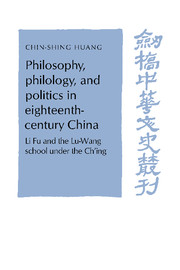 Philosophy, Philology, and Politics in Eighteenth-Century China
Philosophy, Philology, and Politics in Eighteenth-Century China Book contents
- Frontmatter
- Contents
- Foreword by Professor Ying-shih Yü
- Acknowledgments
- Abbreviations
- Introduction
- 1 The original argument (1): “Chu Hsi versus Lu Hsiang-shan” (Chu-Lu i-t'ung): A philosophical interpretation
- 2 The original argument (2): Wang Yang-ming and the problematic of “Chu Hsi versus Lu Hsiang-shan”
- 3 The critical dimension in the Confucian mode of thinking: The conception of the Way as the basis for criticism of the political establishment
- 4 Li Fu: an exemplary Lu-Wang scholar in the Ch'ing dynasty (1): His life
- 5 Li Fu: an exemplary Lu-Wang scholar in the Ch'ing dynasty (2): His thought
- 6 Li Fu and the philological turn
- 7 The price of having a sage-emperor: the assimilation of the tradition of the Way by the political establishment in the light of the K'ang-hsi emperor's governance
- Conclusion
- Chinese glossary
- Bibliography
- Index
7 - The price of having a sage-emperor: the assimilation of the tradition of the Way by the political establishment in the light of the K'ang-hsi emperor's governance
Published online by Cambridge University Press: 17 September 2009
- Frontmatter
- Contents
- Foreword by Professor Ying-shih Yü
- Acknowledgments
- Abbreviations
- Introduction
- 1 The original argument (1): “Chu Hsi versus Lu Hsiang-shan” (Chu-Lu i-t'ung): A philosophical interpretation
- 2 The original argument (2): Wang Yang-ming and the problematic of “Chu Hsi versus Lu Hsiang-shan”
- 3 The critical dimension in the Confucian mode of thinking: The conception of the Way as the basis for criticism of the political establishment
- 4 Li Fu: an exemplary Lu-Wang scholar in the Ch'ing dynasty (1): His life
- 5 Li Fu: an exemplary Lu-Wang scholar in the Ch'ing dynasty (2): His thought
- 6 Li Fu and the philological turn
- 7 The price of having a sage-emperor: the assimilation of the tradition of the Way by the political establishment in the light of the K'ang-hsi emperor's governance
- Conclusion
- Chinese glossary
- Bibliography
- Index
Summary
Since the time of Confucius, thinking about the relationship between political rulers and cultural elites had evolved into a particular conceptualization. The Way and political power had separated and their final unity was ideologically prescribed as the ultimate political–cultural goal. The author of The Doctrine of the Mean was aware of this commitment when he wrote:
One may occupy the throne, but if he does not have the proper virtue, he should not presume to make ceremonies or music. One may have the virtue, but if he does not occupy the throne, he likewise should not presume to make ceremonies or music.
As a matter of mutual interest, both political and cultural elites had to accept a basic division of labor: rulers were in charge of government, while Confucian scholars supervised the preservation and transmission of the Way. The Records of the Rites in The New T'ang History illustrated this point quite well:
Before the Three Dynasties, the ruling authority came from one source, and ceremonies and music spread to the world; after the Three Dynasties, the ruling authority came from two sources, and ceremonies and music became empty names.
Since they saw themselves as representatives of the Way, Confucians were theoretically justified in opposing political authorities whenever the situation required. Authentic Confucians since Confucius and Mencius had upheld this idea, and Sung and Ming Confucians with their sense of “continuity” or “tradition” further reinforced it.
- Type
- Chapter
- Information
- Philosophy, Philology, and Politics in Eighteenth-Century ChinaLi Fu and the Lu-Wang School under the Ch'ing, pp. 143 - 168Publisher: Cambridge University PressPrint publication year: 1995


